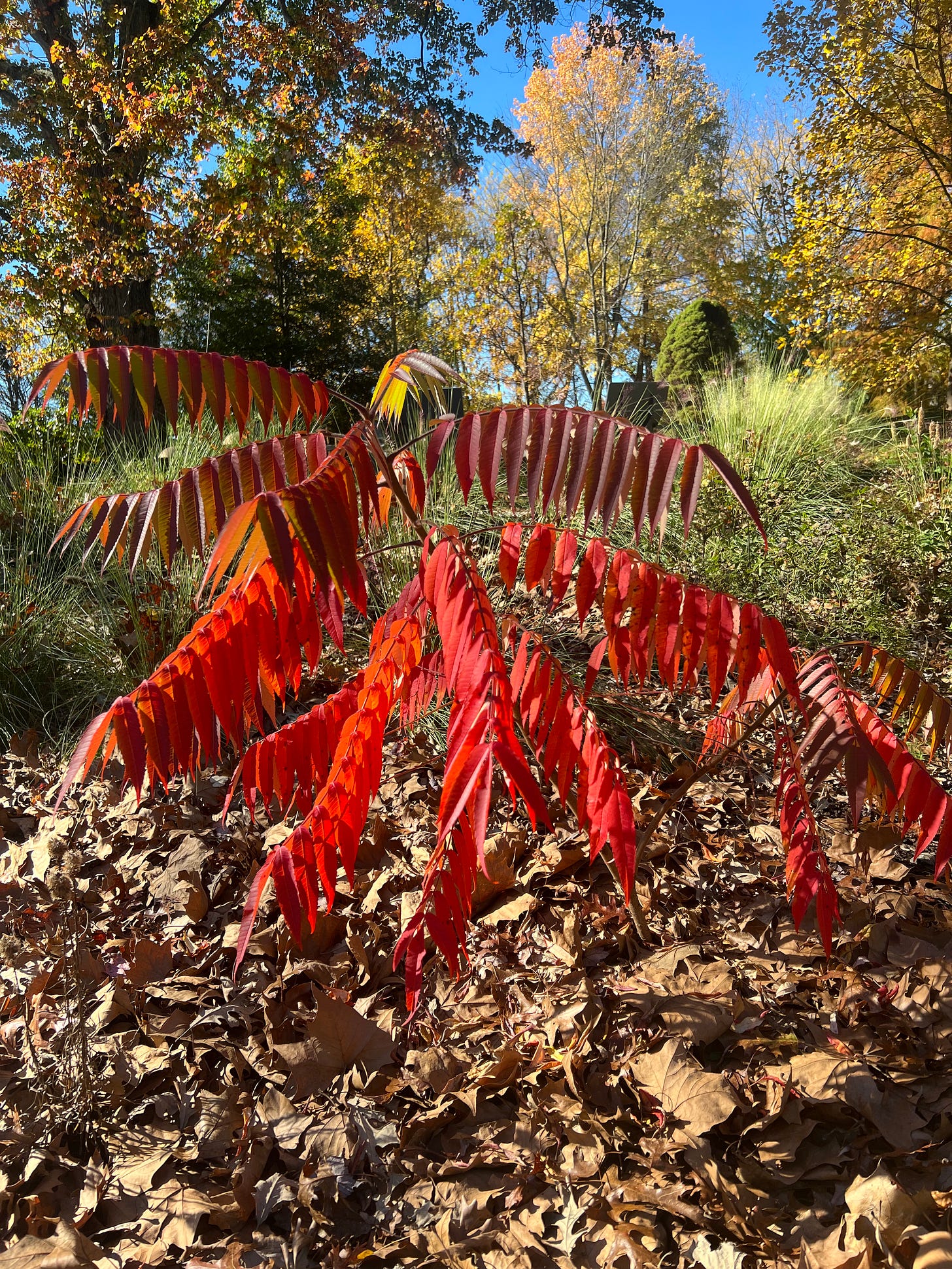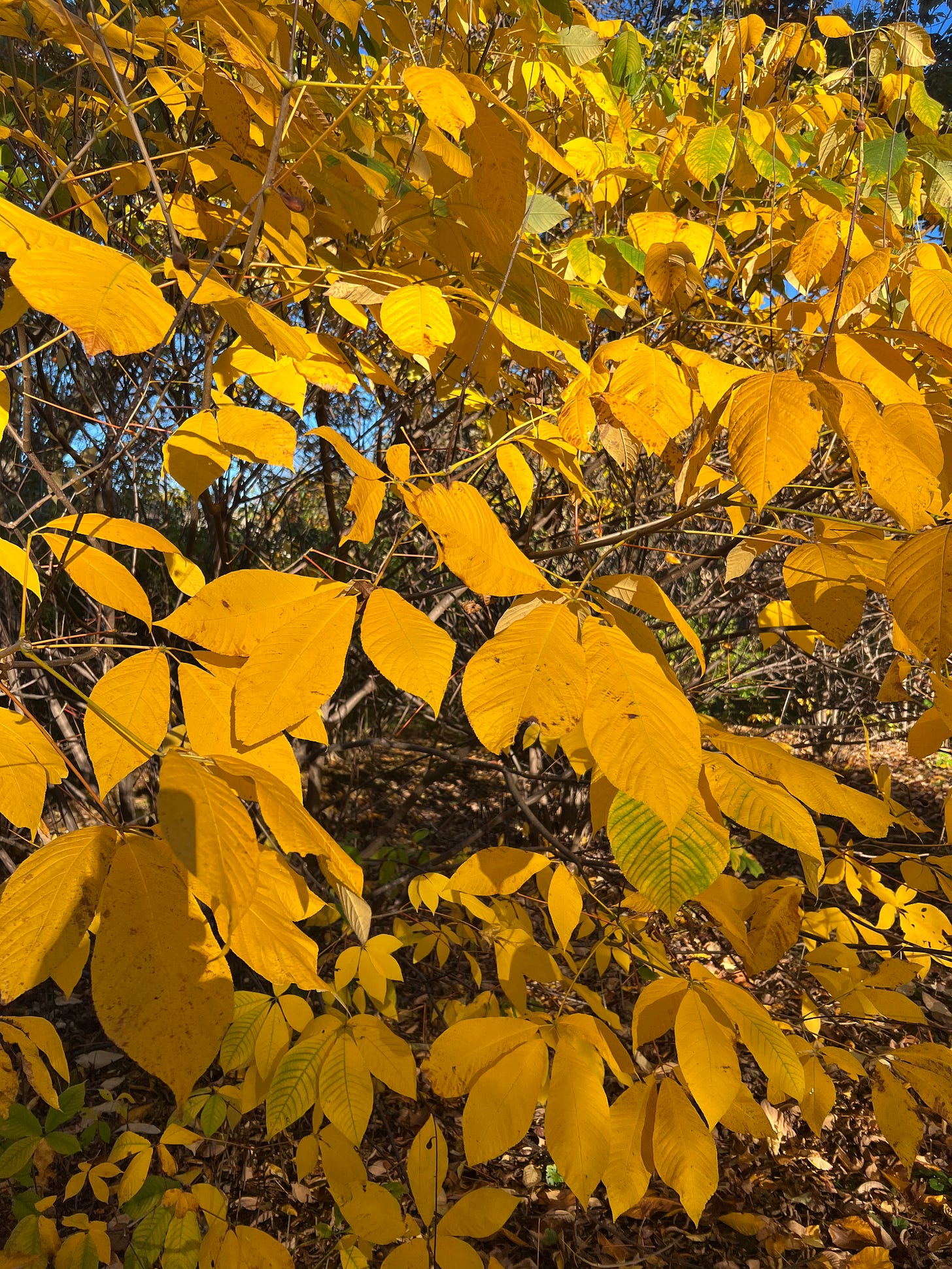I’ve been down to the short strokes and up against a deadline on the novel I’m writing for my Masters of Environmental Studies degree from the University of Pennsylvania, so I didn’t get out to walk the Puddock Hill property much over the past couple weeks.
Of course, I can see some things from my window, mostly changing leaf colors and the steady drift of leaves down to the ground. We have done some power blowing, but the lawn remains littered with leaves at the moment.
Wait. Wow. I just used that word “littered” so casually.
We think of litter as a bad thing. It certainly is bad if it means an empty bottle of Coke tossed alongside the highway, but etymologically it derives from “lectus,” Latin for bed. When leaves litter the forest floor, that’s good, of course. They form a healthy, botanically essential bed there. Maybe “blanket” would be a better word for what the leaves do, but please permit me to stick with the word “litter” for an easier segue.
There is a paradox at the heart of backyard stewardship. On one level, advocates of this approach suggest we stop viewing neatness as a gardening virtue. Respect the litter! As the British author of the Radicle newsletter, another Substack to which I subscribe, urged his readers just this week: “Loosen the grip of control and perfectionism, performance, appearances. Be less tidy and controlling. Let go of indoctrinated ideas of tidiness and perfectionism...”
On another level, however, the backyard steward is pursuing a different kind of perfectionism: the restoration of nature. This requires not only interrogating the idea that the manicured garden represents virtue, but intervening to set nature right where we have already sent it haywire.
In an earlier newsletter, I wrote about Alan Watts’s parsing of karma, which in his analysis means coming to misery when the world defeats our efforts to play God. The advice of the Buddhist is to stop playing God, to let go. But the educated backyard steward must play God precisely because mankind has been playing God for so long.
Today we reap the whirlwind of our actions. A 69 percent decline in animal species worldwide in the past 50 years. Similar declines in the insect populations that provide a multitude of ecological services. Wholesale destruction of ecological niches such as wetlands. The promotion of invasive species that wreak havoc upon native ecosystems.
When I sent my Capstone novel off to readers yesterday and finally had a chance to get out of the house, I took a walk around the property. The late summer flowers are finished, and the fall asters are in decline. In the barn meadow and the wet meadow, perennials such as goldenrod and mountain mint and sedge have gone to seed. Among their drooping tawny sprigs, groups of sparrows flitted around, feeding on seed heads and late insects. From the perspective of spring and summer, these meadows look a mess. From the perspective of a bird, they are perfect.
On my walk, many younger trees, both planted and volunteer, have already lost all their leaves. While we have marked some of them, it would be an unfathomable chore to mark them all, and unsightly as well. I found myself wondering how best to go about not mowing down the good guys along with the bad when we do seasonal cleanup in March. Maybe, I mused, we should skip the cleanup and hit the invasive plants when they’re more easily identifiable later in spring, but that may prove impractical.
As for the leaves, as frequent readers know, we use them unchopped to mulch our planting beds, and the rest will be blown under trees or toward the wilder edges of the property. We have cut back on lawn, but we’re not prepared to let it go entirely.
All of the above is management—stewardship. In the landscape, this amounts to playing God. Why not let natural systems do whatever they want to do without my intervention? Let trees of all sort grow where they may. Let the deer browse and rub at will. Let the big pond go green with algae.
Because, quite simply, it’s too late for that. We have collectively changed so much of our environment that we must now manage for ecologically responsible restoration. There are too few places around me where pollinators can avoid the indiscriminate scythe of neonicotinoid pesticides, the No.1 culprit in the decline of insect populations, though far from the only cause. There are too few places around me where invasive plants don’t impose themselves on natives. There are too few healthy woods. There is too few of everything that once supported a functional local biome.
The backyard steward’s paradox is this. We intervene because we have already intervened on the wrong side of the equation, and this has tipped the balance so that we cannot help but continue to intervene.
Benign neglect is one of our tools. Unfortunately, it can’t be the only one.
Fall color at Puddock Hill this week includes…native Staghorn sumac (Rhus typhina):
Native Buckeye (Aesculus):
Native Sweetgum (Liquidambar styraciflua):
Native Sourgum (Nyssa sylvatica):
Native Sassafras (Sassafras albidum):







